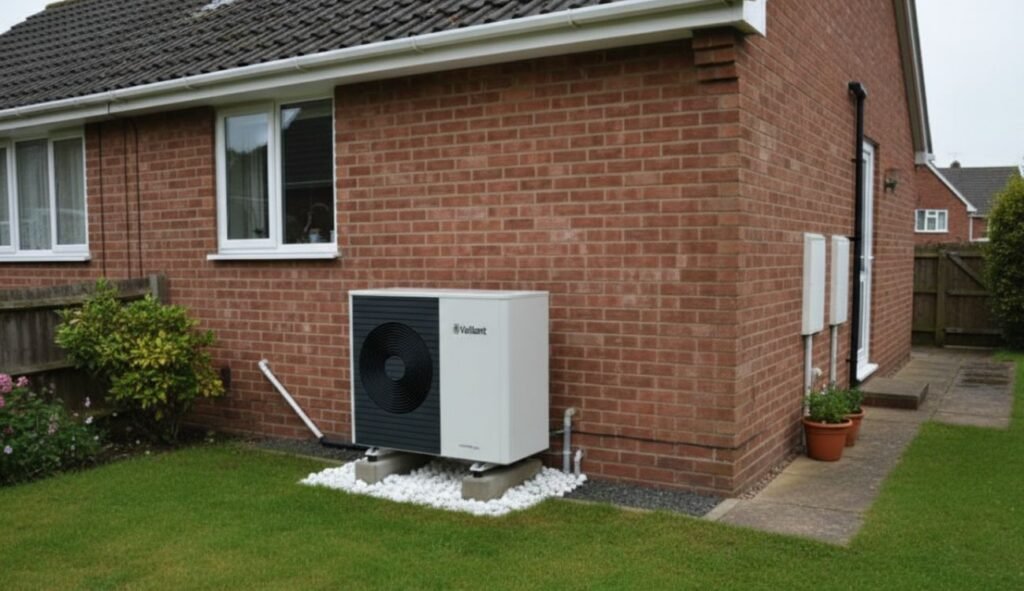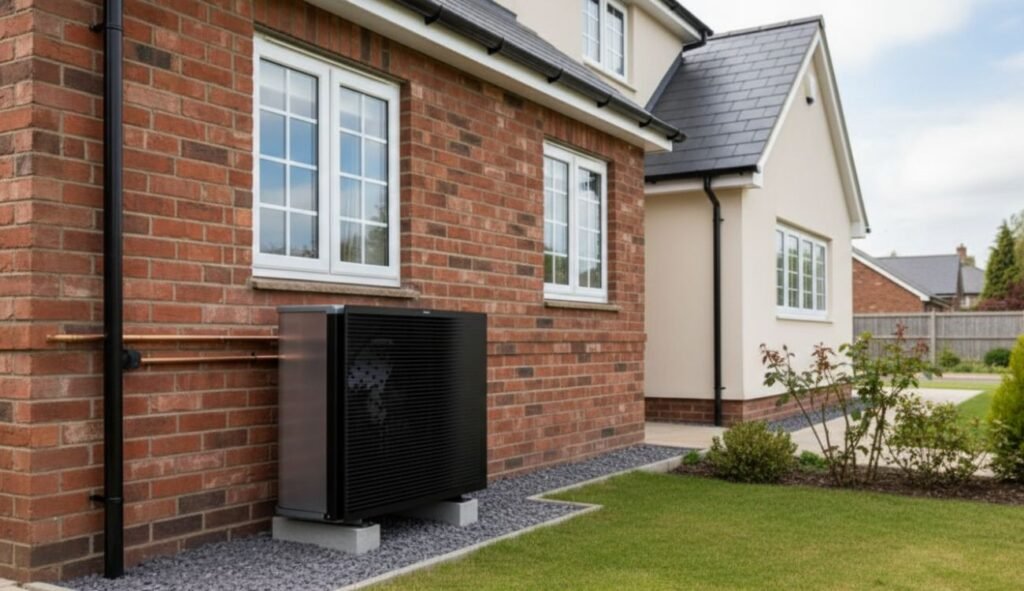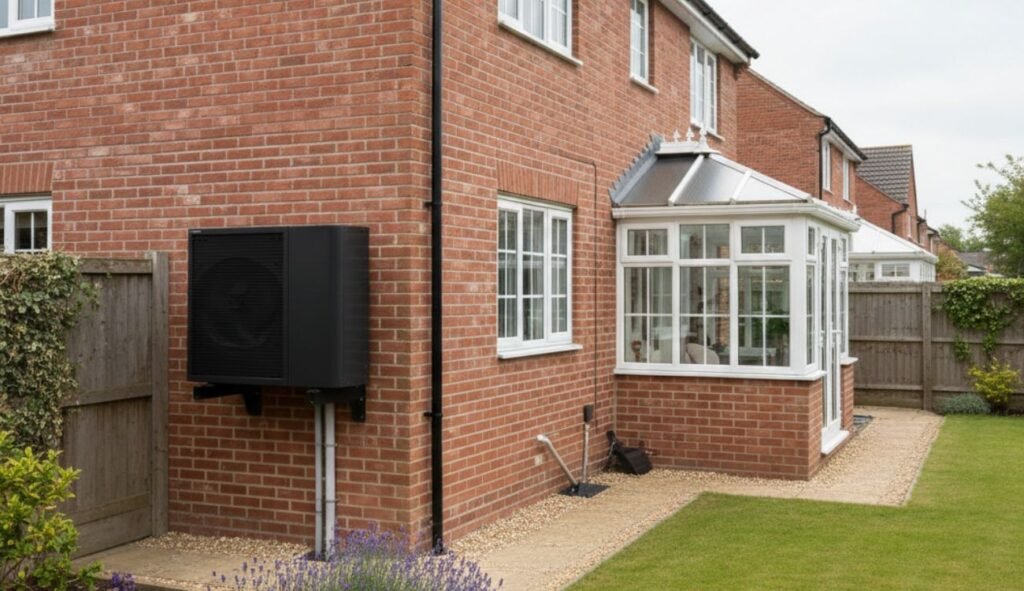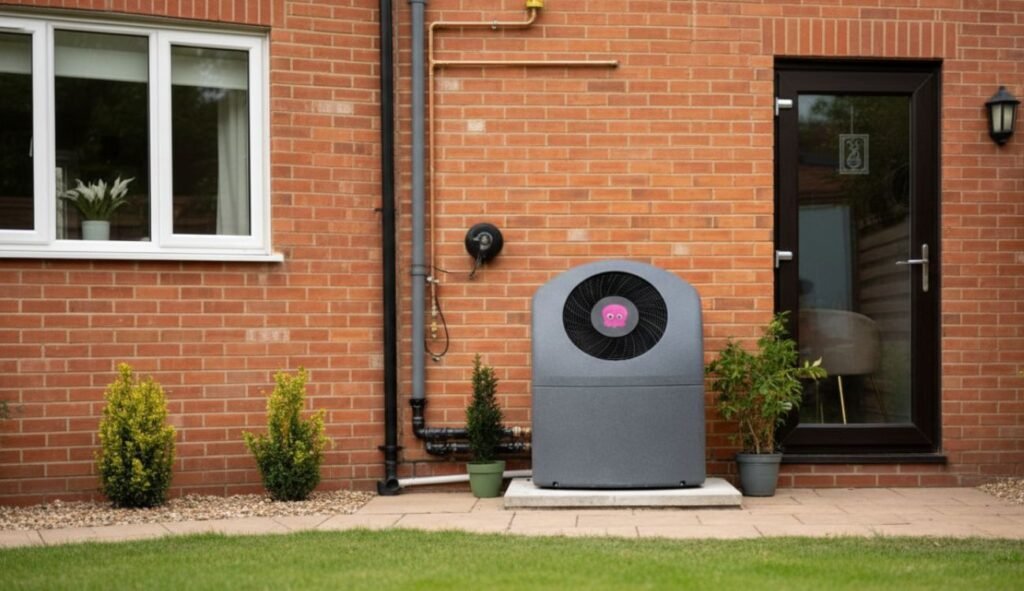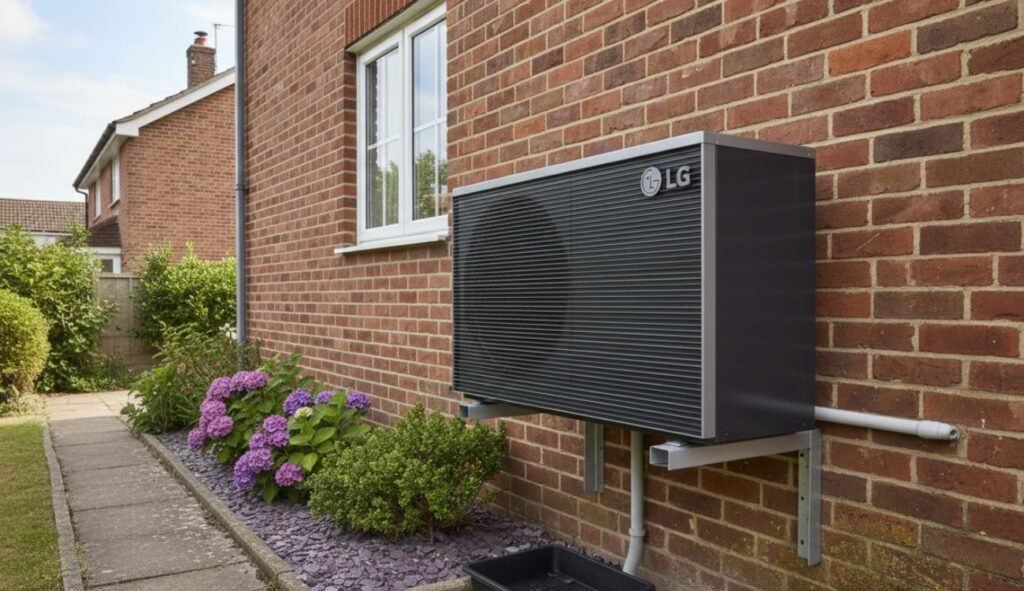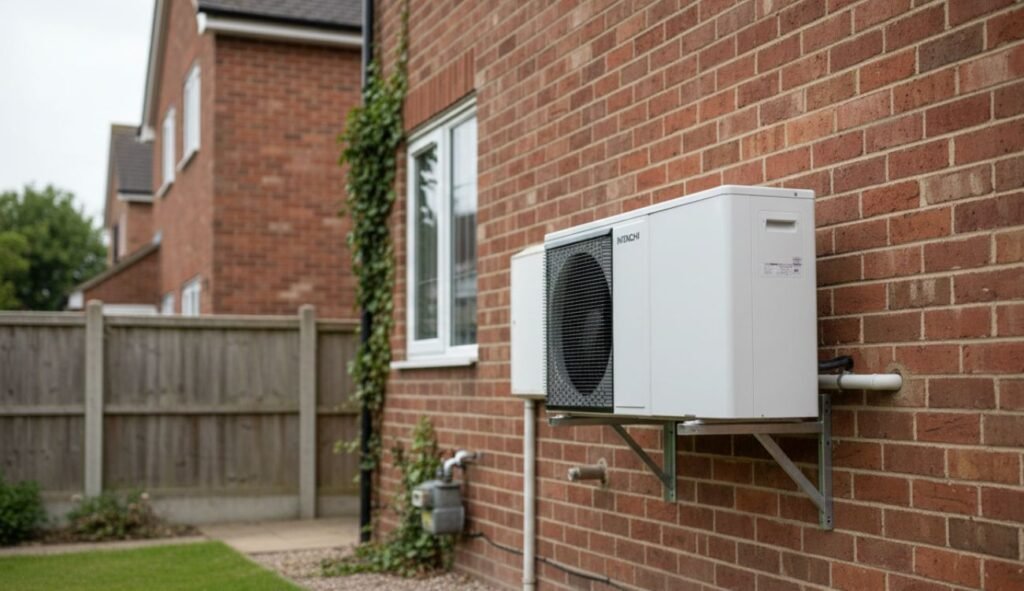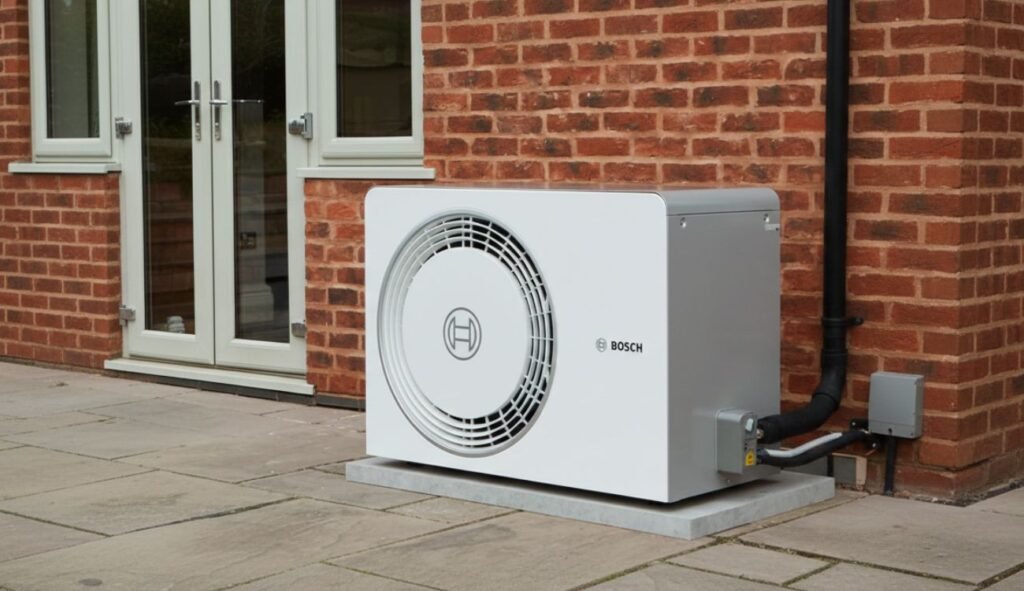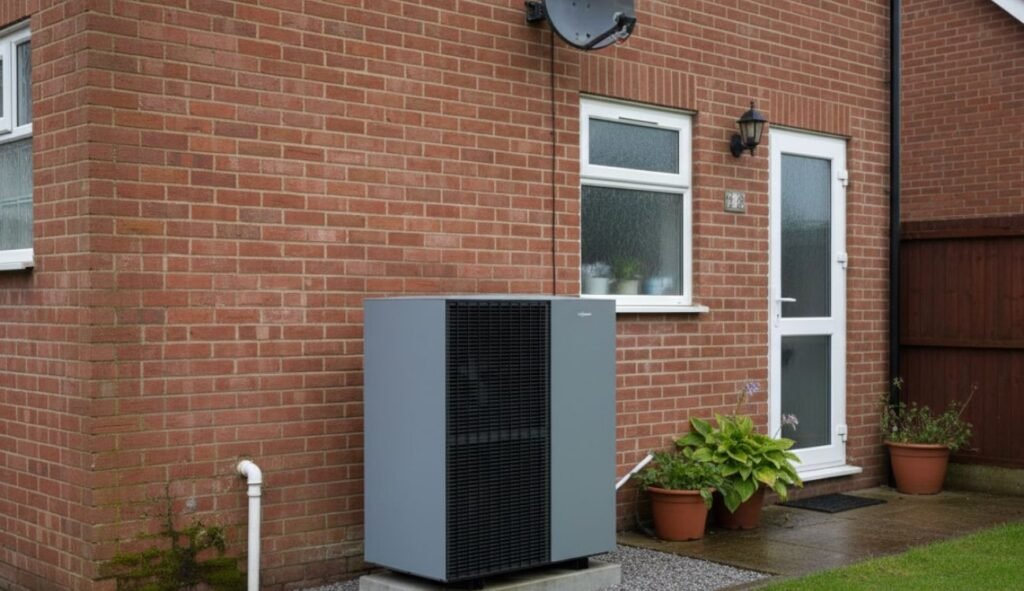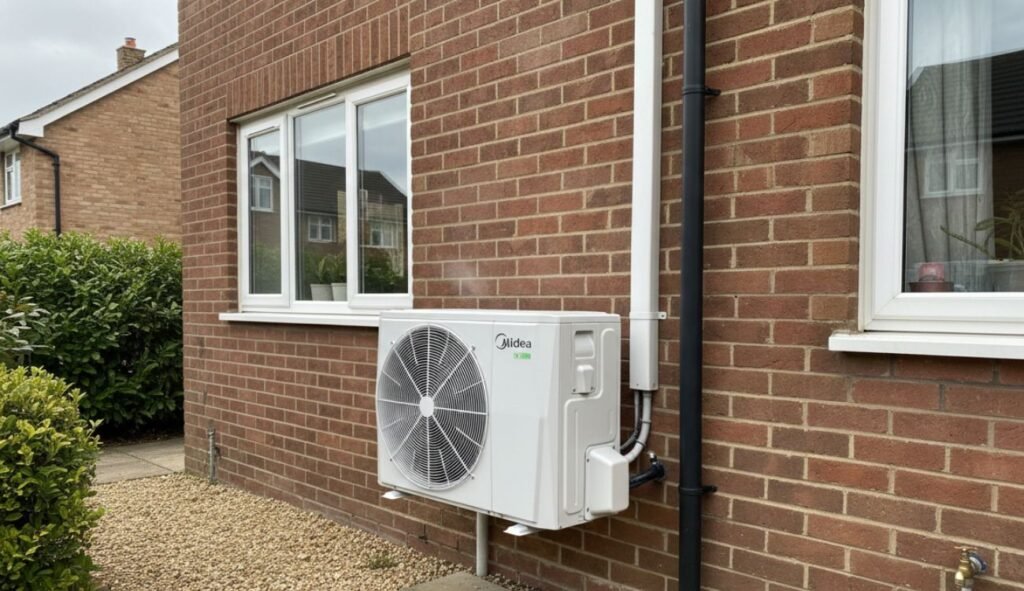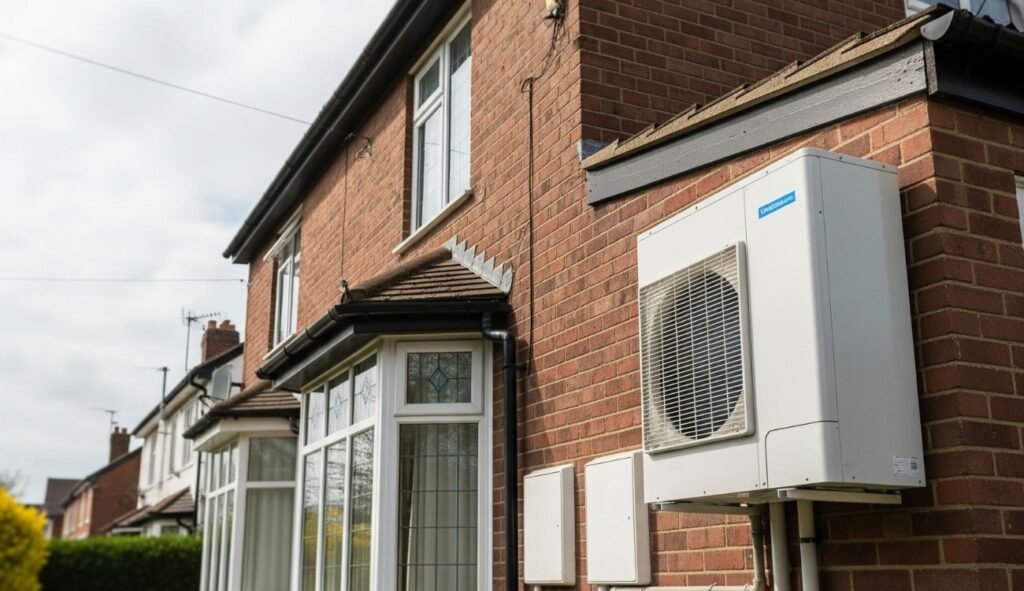High temperature heat pumps are revolutionising home heating in the UK, offering an energy-efficient, low-carbon alternative to traditional gas boilers. As homeowners, landlords, and commercial property owners seek sustainable heating solutions, high temperature heat pumps stand out for their ability to deliver reliable warmth even in older properties.
This guide discusses the costs, benefits, suitability, and practical considerations of high temperature heat pumps, helping you make an informed decision for your property.
Whether you’re in Tyne and Wear, Newcastle, or the wider North East, Future Heat offers expert air source heat pump installation services tailored to your needs.
Request a free quote from Future Heat today to start your journey towards greener heating.
What Are High Temperature Heat Pumps?
High temperature heat pumps are advanced heating systems designed to produce hotter water (up to 80°C) compared to standard heat pumps, which typically operate at 55°C or lower.
According to the Energy Saving Trust, they work by extracting heat from the outside air or ground, compressing it to increase its temperature, and transferring it to your home’s heating system.
This makes them ideal for properties with existing radiators, as they can achieve temperatures similar to gas boilers without requiring major system upgrades.
How Do They Differ from Standard Heat Pumps?
Unlike standard air source or ground source heat pumps, high temperature models are engineered to deliver higher water temperatures, making them a direct replacement for fossil fuel boilers.
They use advanced refrigerants and compressors to achieve this, maintaining efficiency even in colder climates. This versatility suits UK homes, where winter temperatures can dip below freezing.
Key Features of High Temperature Heat Pumps:
- Higher Output Temperatures: Up to 80°C, suitable for traditional radiators.
- Energy Efficiency: Coefficient of Performance (CoP) typically ranges from 2.5 to 4, meaning 2.5–4 units of heat are produced per unit of electricity.
- Low-Carbon Heating: Reduces CO2 emissions compared to gas or oil boilers.
How Much Do High Temperature Heat Pumps Cost?
The cost of installing a high temperature heat pump varies based on property size, system type, and installation requirements.
According to the Energy Saving Trust, air source high temperature heat pumps are generally more affordable than ground source models, with installation costs ranging from £8,000 to £15,000 after grants.
The UK Government’s Boiler Upgrade Scheme offers a £7,500 grant to offset these costs, significantly reducing the upfront investment for homeowners and landlords in England and Wales. For detailed pricing, see the table below.
| System Type | Avg. Cost (Before Grant) | Cost After £7,500 BUS Grant |
|---|---|---|
| Air Source High Temperature | £10,000–£15,000 | £2,500–£7,500 |
| Ground Source High Temperature | £20,000–£30,000 | £12,500–£22,500 |
| Hybrid System (with Boiler) | £12,000–£18,000 | £4,500–£10,500 |
Are There Additional Costs to Consider?
Additional costs may include radiator upgrades, hot water cylinder installation, or electrical system enhancements. For example, older properties may need larger radiators (£200–£500 each) to optimise heat distribution.
A heat pump-ready hot water cylinder costs around £1,500, according to the Centre for Sustainable Energy. Always consult an MCS-certified installer, like Future Heat, to assess your property’s needs.
What Are the Benefits of High Temperature Heat Pumps?
High temperature heat pumps offer multiple advantages for UK homeowners, landlords, and commercial property owners. Their efficiency and compatibility with existing systems make them a compelling choice for decarbonising heating.
Why Choose High Temperature Heat Pumps?
- Energy Savings: Achieve 250–400% efficiency, producing 2.5–4 units of heat per unit of electricity, compared to gas boilers at 90% efficiency.
- Carbon Reduction: Significantly lower CO2 emissions, supporting the UK’s net zero goals by 2050.
- Government Incentives: The Boiler Upgrade Scheme provides £7,500 grants, with additional support like ECO4 for low-income households.
- Versatility: Compatible with existing radiators and suitable for older properties without extensive retrofitting.
How Much Can You Save on Electricity Bills?
Savings depend on your current heating system, insulation, and electricity tariffs. According to the Energy Saving Trust, replacing a gas boiler with a high temperature heat pump in a three-bedroom semi-detached home could save £100–£300 annually, assuming an electricity price of 24.5p/kWh and gas at 6.29p/kWh.
Pairing with a smart tariff or solar panels can further reduce costs.
| Current System | Annual Running Cost | High Temp Heat Pump Cost | Potential Savings |
|---|---|---|---|
| Gas Boiler | £800–£1,200 | £900–£1,100 | £100–£300 |
| Oil Boiler | £1,000–£1,500 | £900–£1,100 | £200–£400 |
| Electric Boiler | £1,500–£2,000 | £900–£1,100 | £400–£900 |
Are High Temperature Heat Pumps Suitable for Your Property?
High temperature heat pumps are versatile, making them suitable for most UK properties, including older homes, terraced houses, and commercial buildings. Their ability to deliver high water temperatures means they can work with existing heating systems without major modifications.
Which Properties Are Best Suited?
- Older Homes: Ideal for period properties with high heat loss, as they don’t require low-temperature underfloor heating.
- Terraced Houses: Recent planning changes (May 2025) removed the 1m boundary rule, making installations easier in England.
- Commercial Buildings: Suitable for offices or small businesses with high heating demands, especially when paired with solar PV for cost savings.
- Well-Insulated Homes: While not mandatory, insulation improves efficiency, reducing running costs.
Can They Work with Existing Heating Systems?
High temperature heat pumps integrate seamlessly with existing radiators and hot water systems. According to the Heat Pump Association, they can replace gas or oil boilers directly, as they match the high water temperatures (60–80°C) needed for traditional radiators.
However, some homes may need larger radiators or a heat pump-ready cylinder to optimise performance.
Can They Work with Boilers?
Hybrid heat pump systems combine a high temperature heat pump with an existing boiler, offering flexibility for homes not fully optimised for standalone heat pumps.
The heat pump handles most heating, while the boiler provides hot water or backup during peak demand. This setup is ideal for properties with limited space or high hot water needs, costing £4,500–£10,500 after grants.
What Is the Lifespan of High Temperature Heat Pumps?
High temperature heat pumps have a lifespan of 15–20 years with regular maintenance, according to the Energy Saving Trust.
Annual servicing by an MCS-certified engineer ensures optimal performance and longevity. Compare this to gas boilers, which last 10–15 years, making heat pumps a durable investment.
Do You Need Planning Permission for High Temperature Heat Pumps?
Most air source heat pump installations, including high temperature models, are considered permitted developments in the UK, meaning planning permission is typically not required.
According to GOV.UK, recent rule changes (May 2025) eliminated the need for permission if the unit is within 1m of a neighbour’s boundary, addressing noise concerns. However, exceptions apply:
- Listed Buildings: Require approval from your local authority.
- Conservation Areas: May need additional checks.
- Noise Restrictions: Units must operate below 42dB, comparable to a fridge (BBC News).
Always confirm with your local planning department or an MCS-certified installer like Future Heat to ensure compliance.
How Do High Temperature Heat Pumps Support Net Zero Goals?
By using electricity instead of fossil fuels, high temperature heat pumps reduce carbon emissions, aligning with the UK’s target of net zero by 2050.
The Department for Energy Security and Net Zero notes that heating accounts for 14% of UK emissions, making heat pumps critical for decarbonisation. Pairing with renewable electricity sources like solar panels enhances their environmental impact.
FAQs
Can High Temperature Heat Pumps Cool My Home?
Yes, many high temperature heat pumps offer cooling capabilities by reversing the heat transfer process, extracting heat from indoors to outdoors. This is ideal for summer comfort but requires a compatible system, such as air-to-air units or specific radiators.
Are High Temperature Heat Pumps Eligible for the ECO4 Scheme?
Yes, low-income households or those in fuel poverty may qualify for the ECO4 Scheme, which funds heat pump installations, including high temperature models, to improve energy efficiency.
How Noisy Are High Temperature Heat Pumps?
Modern units operate at 42dB or lower, similar to a fridge, and noise concerns have been mitigated by relaxed planning rules (May 2025). Proper placement by an installer like Future Heat ensures minimal disturbance.
Can High Temperature Heat Pumps Work with Solar Panels?
Yes, pairing with solar photovoltaic (PV) panels can reduce running costs by using self-generated electricity. The Smart Export Guarantee (SEG) allows you to earn money for excess power exported to the grid.
What Maintenance Do High Temperature Heat Pumps Require?
Annual servicing by an MCS-certified engineer is recommended to check refrigerant levels, clean filters, and ensure efficiency. Maintenance costs typically range from £100–£200 per year.
Our Verdict
High temperature heat pumps offer a sustainable, efficient heating solution for UK homeowners, landlords, and commercial property owners. With the ability to integrate with existing radiators, deliver significant energy savings, and reduce carbon emissions, they are a future-ready choice for properties in Tyne and Wear, Newcastle, and beyond.
The £7,500 Boiler Upgrade Scheme makes them more affordable, while their long lifespan ensures lasting value. By choosing an MCS-certified installer like Future Heat, you can navigate installation complexities with ease.
Jamie Maguire is Managing Director at Future Heat Ltd, the UK-based renewable energy company specialising in heat pumps, solar panels and energy-efficient boiler solutions. He leads the company’s strategic vision to decarbonise homes and businesses across the UK by delivering innovative, sustainable heating and power systems. Jamie is passionate about shaping the future of energy, supporting communities and empowering teams of skilled engineers to deliver lasting value and carbon reductions nationwide.


